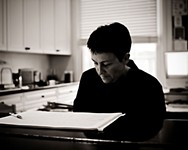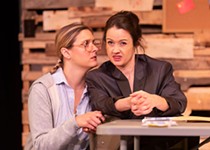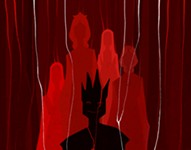University of Texas University Orchestra's Fall 2015 Concert
The maiden voyage of the new school year was a pleasure cruise thanks to a program of audience-friendly music and the connection that the students maintain with the crowd
Reviewed by Robi Polgar, Fri., Oct. 23, 2015
Comprised mostly of nonmajors, UT's University Orchestra gathers under the twin batons of maestros David S. Platt and James O. Welsch to perform classical music, something the students do in addition to their regular curricular activities. They do it for fun, with dedication – and they do it with skill, passion, and a connection to their audience that more elite groups eschew in favor of maintaining a professional distance. That connection – and the rough and tumble of a first performance of a new school year – made the UTUO's maiden voyage of '15-'16 a pleasure cruise.
The audience-friendly program included selections by Rossini, Puccini, Bizet, and Beethoven, all of which offered earfuls of drama. It might be an easy rejoinder that, when three of the composers are best known for their operas, as a matter of course the music will be dramatic. Yet only one selection was from an opera.
That was Rossini's overture to The Barber of Seville – a familiar first salvo that highlighted individual instruments from brass to woodwinds to harp, and even pitted the violins against the cellos in a thrumming give and take. Seeing music performed with such exuberance is as much fun as listening to it – a recurring theme for the evening.
Puccini's Preludio Sinfonico followed, a work the composer wrote while at conservatory and not much older than the orchestra's student performers. It offered romantic, moody swells and hints of the composer's impending masterpieces. The third selection was Bizet's L'Arlésienne Suite No. 1, with its familiar "March of the Kings" prelude and undulating "Carillon" finale – the horns playing the part of pealing bells.
The final selection was Beethoven's Symphony No. 6 in F Major. The "Pastoral" symphony gives us Beethoven as tour guide, leading the listener into the countryside, where his music evokes carriage rides through rolling hills, water flowing in a brook, bird calls, a light rain that darkens to a sudden storm, and local folk enjoying a simpler, robust life. The lolling first movement infected the musicians, whose bodies swayed to the music of the imaginary carriage ride.
At times, it appeared that the musicians were listening to themselves – call it a third ear – but that was part of their charm. Moments of self-awareness amidst so much concentration. Part of the beauty of the live performance meant spying moments such as the cellist struggling with a stiffly bound score that would not sit still; the violist with the fixed, delightful smile; furrowed brows on the strings; nervous glances into the house. Both conductors seemed to be engaging the musicians simultaneously as individual performers and as a unit, keeping their charges focused through a combination of encouraging body language and gestures.
Finally, kudos to the array of soloists featured throughout the evening: the alto saxophone in the Bizet; horn, flute, and bassoon in the Beethoven; and a special nod to the savior of the evening (as conferred by maestro Welsch), the second oboe, who performed star turns during both the Rossini and the Beethoven. The next concert by the University Orchestra is Nov. 24. Lovers of classical music lovingly played by dedicated young musicians, take note.
University of Texas University Orchestra
Bates Recital HallOct. 13













